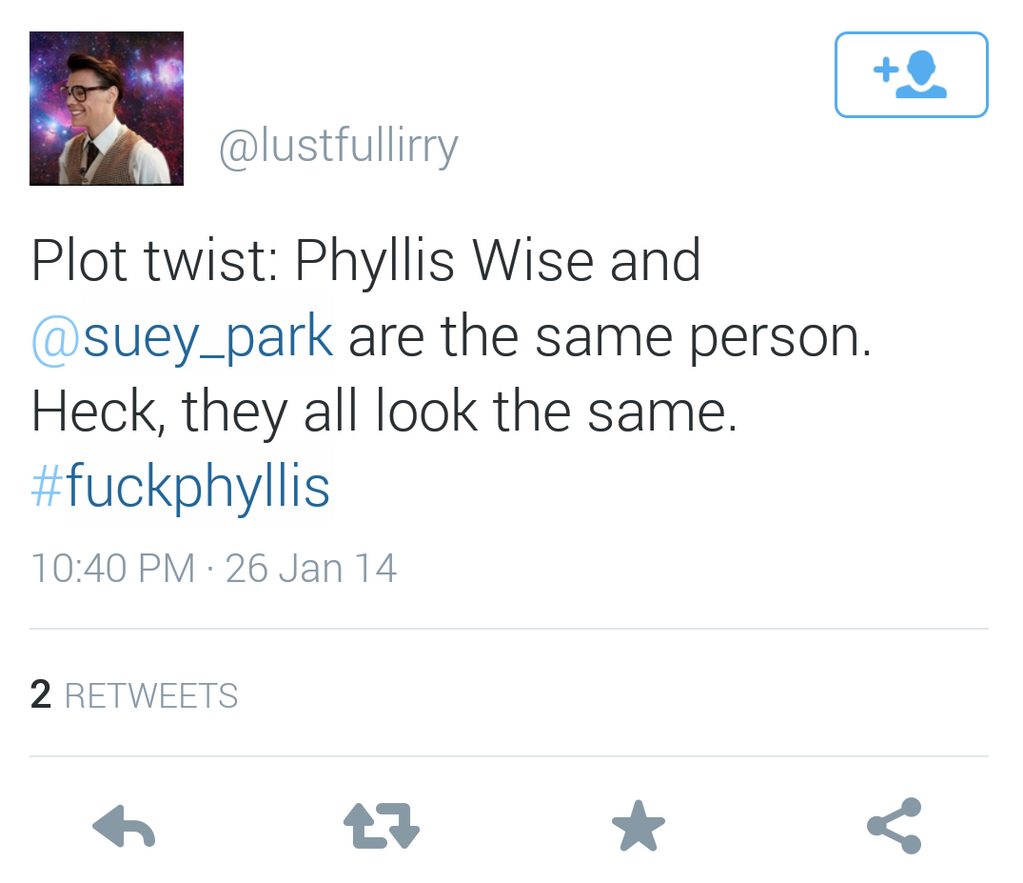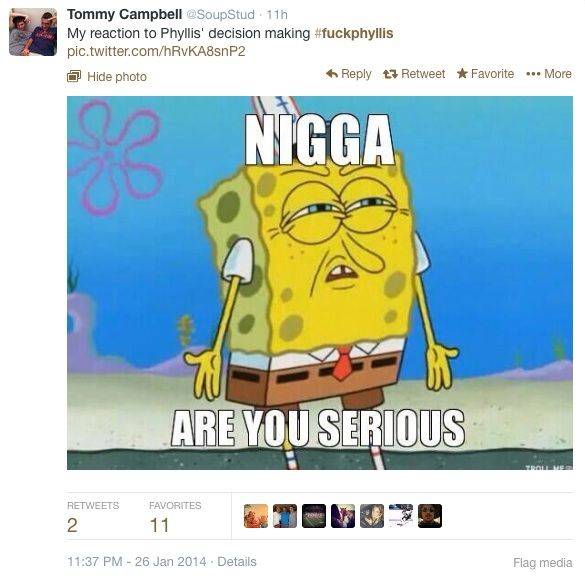Last night, Chancellor Phyllis Wise sent an email out to the University of Illinois at Urbana-Champaign student body informing them that, despite the extreme cold that was forecasted for today, school would still be in session. For many students, this didn’t sit well, and as such, they took to Twitter to voice their anger. If you’ve already read the Buzzfeed article posted early this morning, you know that a #fuckphyllis hastag soon emerged, as if conjured by a bro-spell cast by hundreds of privileged white teenagers and early 20-somethings, providing the necessary meta-data to track what has become a hateful, sexist and racist attack on an administrator guilty of telling the students at her university to shake off their hangovers, put on their damn North Face jackets, and head on over to class.
Of course, the problem here is that this is such a predictable response from an overwhelmingly white, upper-income student body that, on a functional level, is able to go most of their time at U of I without having their white privilege challenged or called into question. As an institution, this is something that Illinois has struggled with throughout their history, something that smart people have been attempting to address for decades. The problem here is that, the issues undergirding our lack of diversity connect to a larger culture of privilege. Each autumn, our campus gets a new batch of students, many of whom hail from predominantly white school districts that spend a great deal of money on their students per annum. When these students arrive to Illinois, they see themselves reflected on campus almost everywhere they go. Their white-ness feels normal, just as normal as it felt back in Naperville, making it as if their race does not exist. It is only when they’re confronted with difference that they balk.

It almost goes without saying that if Wise were a white man, nobody would have attacked him on the basis of his gender or his race, which provides some context to understand just how racism functions in these situations. But first, let’s establish that racism isn’t prejudice, it’s prejudice plus power. In this scenario, it seems like Phyllis Wise has the power — she did, after all, tell a bunch of people to go to school — but her position in the university’s hierarchy is structural and therefore limited by the structure that grants power to her. There are checks and balances created to keep her from abusing her power, and if she does go ahead and abuse her power, there’s a system in place to punish her.
The students who Tweeted sexist and racist things about Chancellor Wise rely on a different sort of power. Theirs comes from a culture that supports their feelings of exceptionalism and privilege — one that assures them of their racial superiority on a daily basis. In attacking Wise, they are enacting a very old narrative that states their superiority regardless of social rank, thus pejorating Chancellor Wise and all other minorities in the process. But that was the point, right? To put Chancellor Wise in her place, right? To use language that you knew would get noticed in order to express the extent of your anger and frustration over the fact that you’ll have to go to class on a day you’d rather be sitting at home, sipping the Starbucks Hot Chocolate that mom slipped into your stocking last month, right?
HAIL TO THE CHIEF
I get why people are sick of discussing The Chief — people feel strongly about it, and as such, they have a hard time talking to people who disagree with them on the subject. I know I do. But ultimately, it’s just too important a topic to move past given all it symbolizes, especially given the situation at hand: namely, the entitlement that is ingrained in the very underpinnings of white culture.

I should say now that I’m a white townie who attended the University of Illinois and currently serves on several alumni boards here. Some of my very first memories are of seeing the Chief at halftime during football and basketball games. At home, while watching the basketball team play, I would practice my Andy Kaufman buzzer beater during commercials and do Chief Illiniwek’s dance as best I could during halftime. I grew up in a town and in a household that was mesmerized by the Chief — to this day I still experience physiological responses that I’ve come to associate with pleasure while watching old videos the dance. In short, the air that I breathed growing up in Champaign let me believe that there was not a problem with representing a culture that has been horrifically marginalized by my own for the purposes of entertainment. I was raised to see American Indians as abstract signifiers of my personal sports affiliation, which is problematic unto itself, but moreover, suggests a mindset that I could have easily fallen into as an adult had I not been confronted by diversity in ways that forced me to rethink my own racist disposition.

This disposition lends itself to a way of thinking that says its OK to do racist things so long as you do them without malintent. All this talk we hear about “loyalty” and “tradition” is meant to obscure the fact that Chief supporters are in fact disloyal to their university which has done away with their beloved mascot. It is as if, in saying these words, Chief supporters are reciting an incantation that allows them to overlook the fact that the traditions they uphold are in direct conflict with those they represent. It’s doublespeak at its best, and amazingly akin to the “I-guess-you-can’t-you-take-a-joke” rhetoric I’m certain the #fuckphyllis hashtag has already adopted. Once it becomes clear that, no, people can’t take a joke if it’s horribly, horribly racist, that rhetoric will turn to a condemnation of the general state of things: 20-year-olds euphemistically lamenting the good old days when you could call a spade a spade.
Those who try to parse the thinking that tells us that it’s OK to attack a woman in a position of power based on her race and her gender, and the thinking that tells us that we can “honor” an American Indian Tribe that settled and moved on from our state hundreds of years ago by dressing a student from the Chicago Suburbs up in Lakota regalia and having him dance around a football field like Glen Vernon after a good hard shot of shake ‘n’ bake meth is not only self-serving, it’s a cheap lawyering of the facts designed to protect a way of being that has come to define white culture in our town and on our campus. In both of these scenarios, the people being represented/attacked are abstract objects in the minds of these students. To them, American Indians are historical figures who danced around and used every part of the animals they killed. To them, Phyllis Wise is that uppity Asian lady who told them to do something they don’t want to do.
Or perhaps I’m simplifying your very well-developed and nuanced perspective here, white, suburban U of I students — in which case, you can rest well knowing that it was just a joke.
UPDATE (1/28/2014 – 4:15 p.m.) — The U of I Student Body President has issued an apology letter to Chancellor Wise on behalf of the students who issued the tweets. Read the SPlog here.








